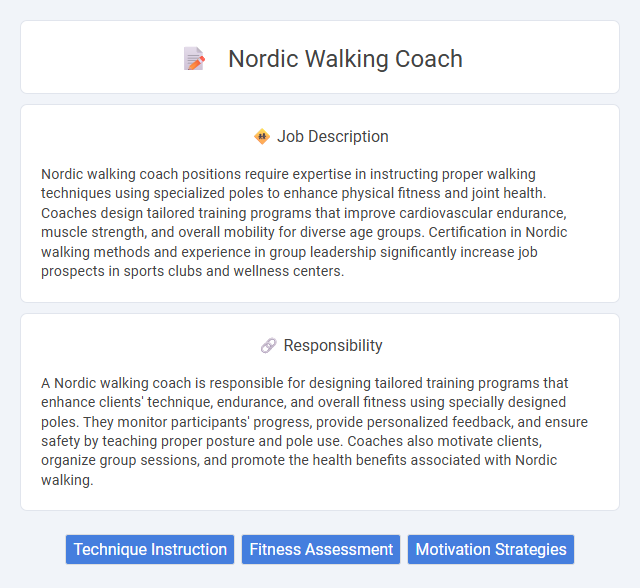
Nordic walking coach positions require expertise in instructing proper walking techniques using specialized poles to enhance physical fitness and joint health. Coaches design tailored training programs that improve cardiovascular endurance, muscle strength, and overall mobility for diverse age groups. Certification in Nordic walking methods and experience in group leadership significantly increase job prospects in sports clubs and wellness centers.
Individuals with a passion for fitness and strong interpersonal skills are likely suitable for a Nordic walking coach role, as it involves guiding people of varying fitness levels and health conditions. Those with good physical stamina and the ability to motivate others may find this job particularly fitting. However, candidates with significant physical limitations or difficulty communicating effectively might find the responsibilities challenging.
Qualification
A Nordic walking coach must possess certification from recognized fitness or outdoor organizations, such as the International Nordic Walking Federation (INWA) or other accredited bodies, ensuring expertise in technique and safety. Comprehensive knowledge of human anatomy, biomechanics, and training principles is essential to design effective and personalized walking programs. Strong communication skills and experience in group instruction enhance a coach's ability to motivate clients and promote proper form to prevent injury.
Responsibility
A Nordic walking coach is responsible for designing tailored training programs that enhance clients' technique, endurance, and overall fitness using specially designed poles. They monitor participants' progress, provide personalized feedback, and ensure safety by teaching proper posture and pole use. Coaches also motivate clients, organize group sessions, and promote the health benefits associated with Nordic walking.
Benefit
Hiring a Nordic walking coach likely increases the probability of improved fitness levels and enhanced walking techniques. Clients may experience better posture, joint mobility, and cardiovascular health from guided sessions. A coach's expertise often contributes to motivation and injury prevention, making workouts more effective and enjoyable.
Challenge
Taking on a Nordic walking coach job likely presents the challenge of mastering diverse techniques to effectively train clients with varying fitness levels. Coaches may face the probable difficulty of motivating individuals to maintain consistency while ensuring proper form to prevent injury. Overcoming these challenges could lead to rewarding experiences in helping others achieve health and wellness goals through this specialized fitness activity.
Career Advancement
A Nordic walking coach role offers significant career advancement through certifications in fitness training and outdoor instruction, enabling access to specialist positions and higher salary brackets. Mastery in biomechanics and personalized coaching techniques enhances client results, positioning coaches as experts in rehabilitation and athletic performance sectors. Networking opportunities within sports organizations and wellness communities further support professional growth and leadership roles in health promotion programs.
Key Terms
Technique Instruction
Nordic walking coaches specialize in teaching proper pole placement, stride mechanics, and body posture to enhance efficiency and prevent injuries. Mastery of technique instruction includes demonstrating correct arm swing, weight transfer, and pacing tailored to individual fitness levels. Effective coaching improves cardiovascular health and muscular endurance through guided practice and personalized feedback.
Fitness Assessment
A Nordic walking coach conducts comprehensive fitness assessments to evaluate clients' cardiovascular endurance, muscular strength, and flexibility, ensuring personalized training plans. Utilizing tools such as VO2 max tests and gait analysis, the coach identifies areas for improvement to enhance walking efficiency and overall health. Regular fitness assessments track client progress, optimize workout intensity, and prevent injury, promoting long-term fitness goals.
Motivation Strategies
Effective motivation strategies in a Nordic walking coach role include setting personalized goals, providing consistent positive reinforcement, and incorporating interactive group activities that foster community spirit. Utilizing progress tracking tools and celebrating milestones enhances client commitment and boosts confidence. Tailoring motivation techniques to individual client needs maximizes engagement and promotes long-term adherence to Nordic walking programs.
 kuljobs.com
kuljobs.com